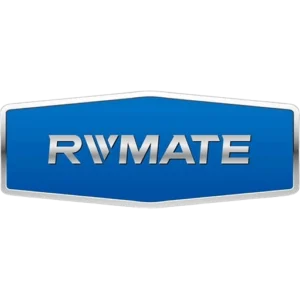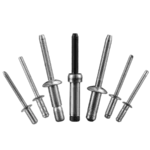Table of Contents
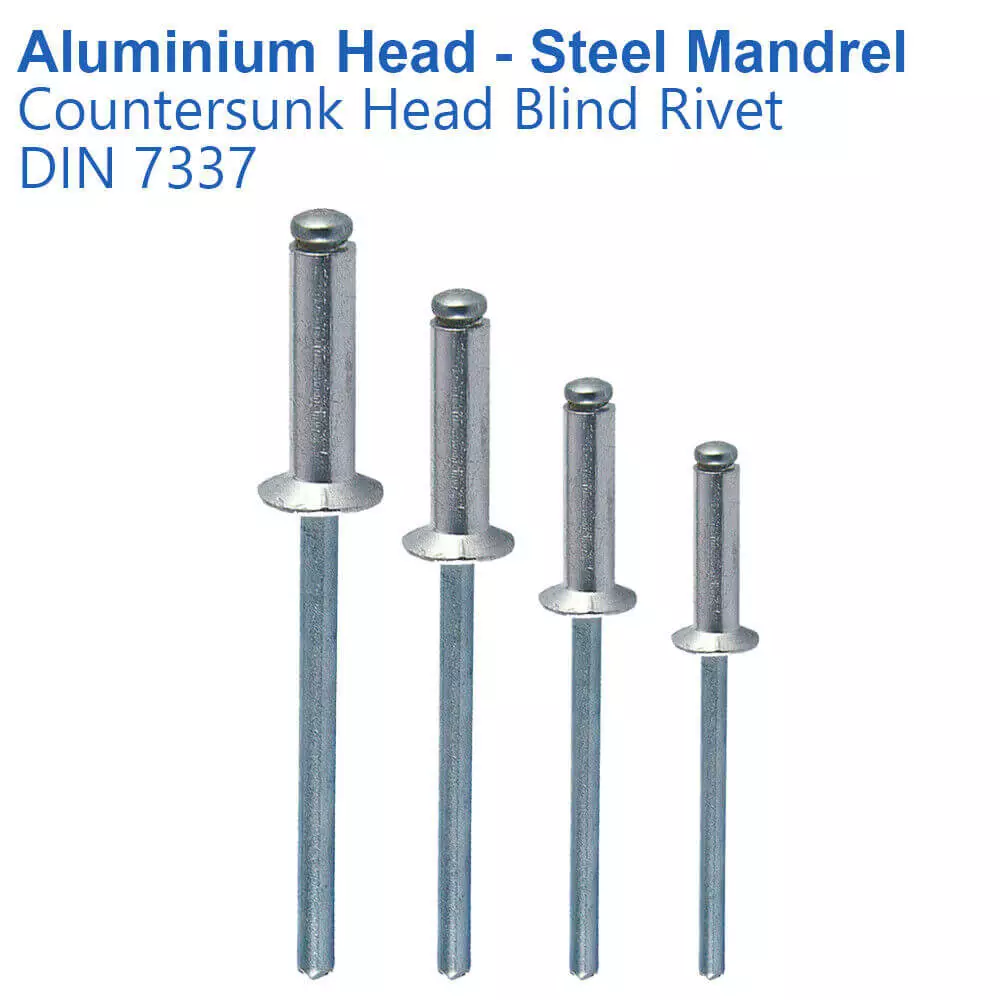
Blind Rivet DIN 7337 is blind rivets according to German standards. It is widely used in Europe and industry. This guide is the most complete guide to blind rivets DIN 7337.
Table of Contents
What is DIN 7337 Spec?
DIN is a standard developed by the German Institute for Standardisation (Deutsches Institut für Normung, DIN). The DIN was developed by German scholars in order to provide rules and guidelines for common and repeated use.
The standard DIN 7337 specifically regulates the design and technical requirements for Blind Rivets. In this standard, the design and technical requirements for blind rivets are regulated. The standard covers the dimensions, materials, properties and requirements for the use of blind rivets and is widely used in manufacturing and applications in Europe and elsewhere.
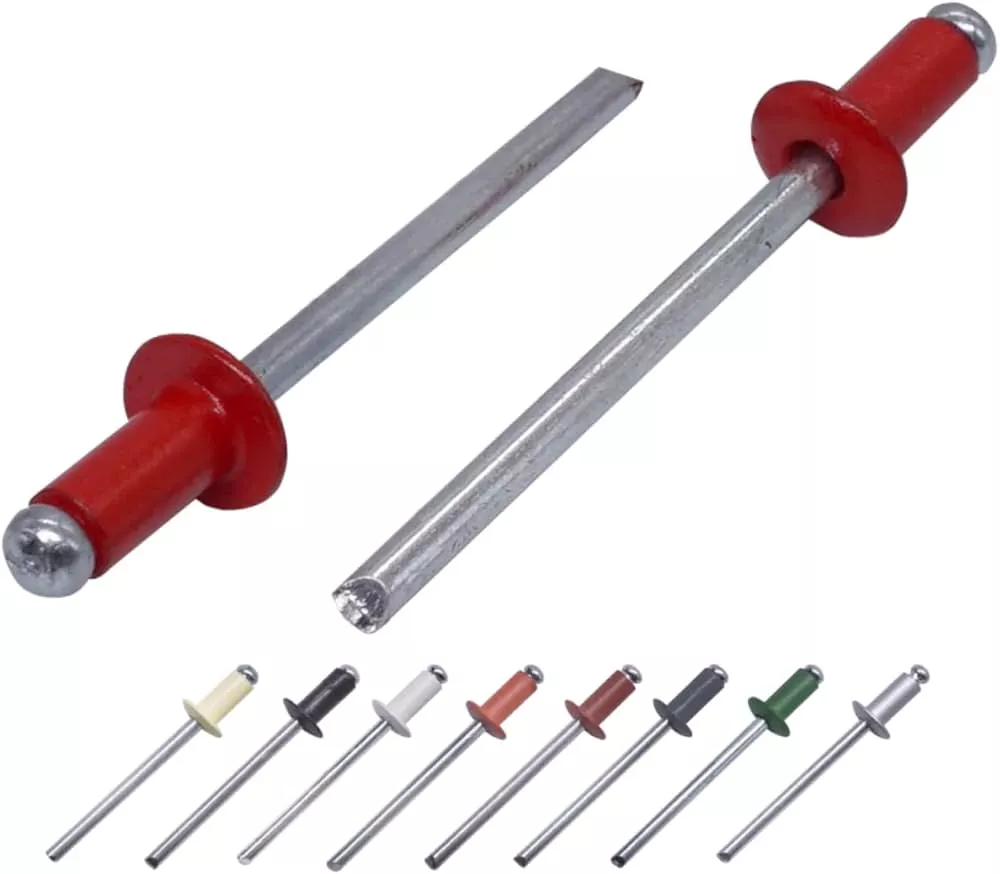
The main points in this standard DIN 7337 are as follows:
- Head types for blind rivets
- Materials for blind rivets
- Dimensional requirements for blind rivets: These include specific dimensional criteria for rivet diameter, length and head shape.
- Mechanical properties of blind rivets: tensile strength and shear strength.
Because of the standardization of DIN 7337, the standard is now widely recognized as a German and European standard. Its specifications are also followed globally by many industries, especially in the automotive, construction and machine building sectors.
Are DIN Standards Still Used?
Of course! DIN standards are used worldwide, especially in Europe and in global markets influenced by German industry. Although standards in many areas have been replaced or supplemented by European (EN) or International Organization for Standardization (ISO) standards within Europe, DIN standards still play an important role in many industries and applications.
In keeping with the times, the DIN 7337 standard has been integrated with the EN standard and is being progressively updated to be in line with the ISO standard. Even so, the DIN 7337 standard remains irreplaceable in many industrial and engineering sectors.
- Manufacturing industry: The DIN standard remains an important technical reference in the fields of mechanical engineering, electromechanical products and construction materials.
- Automotive industry: Many automobile manufacturers use DIN standards as a basis for producing and testing components.
- Engineering and construction: Fields involving precision and high reliability requirements, such as structural engineering, fasteners and construction materials.
What is Blind Rivet DIN 7337?
DIN 7337 Blind Rivet is a blind rivet manufactured to DIN 7337. Blind rivets are used to fasten two or more pieces of material together, often in applications where installation is only possible from one side.The DIN 7337 standard covers the design, dimensions, materials and mechanical properties required for blind rivets.The DIN 7337 standard ensures that blind rivets meet stringent industry standards for quality and consistency.
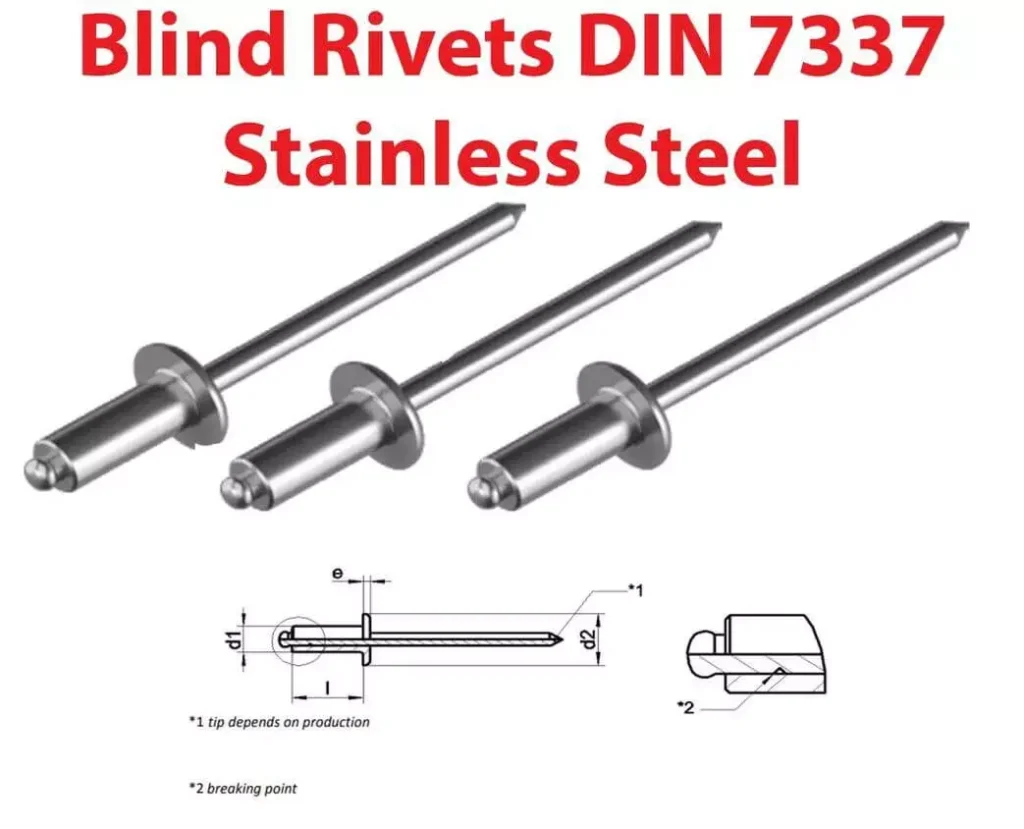
Currently, there are three commonly used standards for blind rivets on the market: DIN 7337, ISO, IFI. And DIN 7337 dominates the Blind Rivet market in Europe. Even in the industrial field, DIN 7337 is one of the most important standards.
Blind Rivet DIN 7337 Dimesions
DIN 7337 blind rivets are blind rivets produced under the DIN 7337 standard.The DIN 7337 blind rivets are available in sizes covering a wide range of diameters and lengths. Common dimensional parameters in this standard are listed below:
- 2.4 mm
- 3.2 mm (1/8″)
- 4.0 mm
- 4.8 mm (3/16″)
- 6.4 mm (1/4″)
In addition to the diameter of the rivet, DIN 7337 Blind Rivets are also standardized for the length of the rivet body.
Different lengths correspond to different rivet grip range. For example, a 3.2mm diameter rivet may have a variety of lengths with grip ranges from 0.5mm to 10mm.

The price of DIN 7337 Blind Rivets depends on a number of factors such as material, size, finish and quantity purchased.
- Materials: Aluminum and steel are moderately priced, while stainless steel blind rivets will be more expensive.
- Size: In general, larger rivets are usually more expensive than smaller ones because they use more material. Large flange head rivets may be more expensive than standard round head rivets.
- Finish: Galvanized or coated finished rivets will be more expensive than untreated ones because they provide additional protection against corrosion.
- Quantity Purchased: Discounted pricing is often available for large quantity purchases.
General price range:
- Aluminum DIN 7337 rivets: between $20 and $50 per thousand pieces, depending on size and quantity purchased.
- Steel DIN 7337 rivets: $30 to $70 per thousand pieces, depending on strength and finish.
- Stainless Steel DIN 7337 Rivets: Prices range from $50 to $150 per thousand, depending on material grade and corrosion resistance.
What is the Difference Between DIN and ISO Standard?
| Comparison Point | DIN Standard | ISO Standard |
| Full Name | Deutsches Institut für Normung (German Institute for Standardization) | International Organization for Standardization |
| Scope | Primarily applicable in Germany and influenced regions | Globally applicable and internationally recognized |
| Fields of Application | Engineering, manufacturing, construction; focuses on German industry needs | Covers various sectors including industry, technology, services |
| Purpose | To provide standards tailored to German industrial and technical requirements | To create globally unified standards for compatibility and trade |
| Adoption | Mainly used within Germany and certain industries internationally | Adopted by many countries and industries worldwide |
| Update Frequency | Updated according to German industry requirements | Updated based on international needs and consensus |
| Numbering Format | Example: DIN 7337 | Example: ISO 9001 |
| Source of Standard | Developed and maintained by German industry and technical organizations | Developed and reviewed by global technical committees and working groups |
| Technical Details | Often very detailed, tailored to local high standards | Balances various country requirements for global use |
| Adoption Compatibility | Often used alongside EN standards (European Norms) | May be adopted as national standards, e.g., ISO/EN, ISO/DIN |
| Content of Standards | Focuses on specific engineering and manufacturing specifications | Typically broader, covering globally relevant technical and management norms |
I have detailed the differences between DIN and ISO standards in the table above. I believe it will help you a lot.
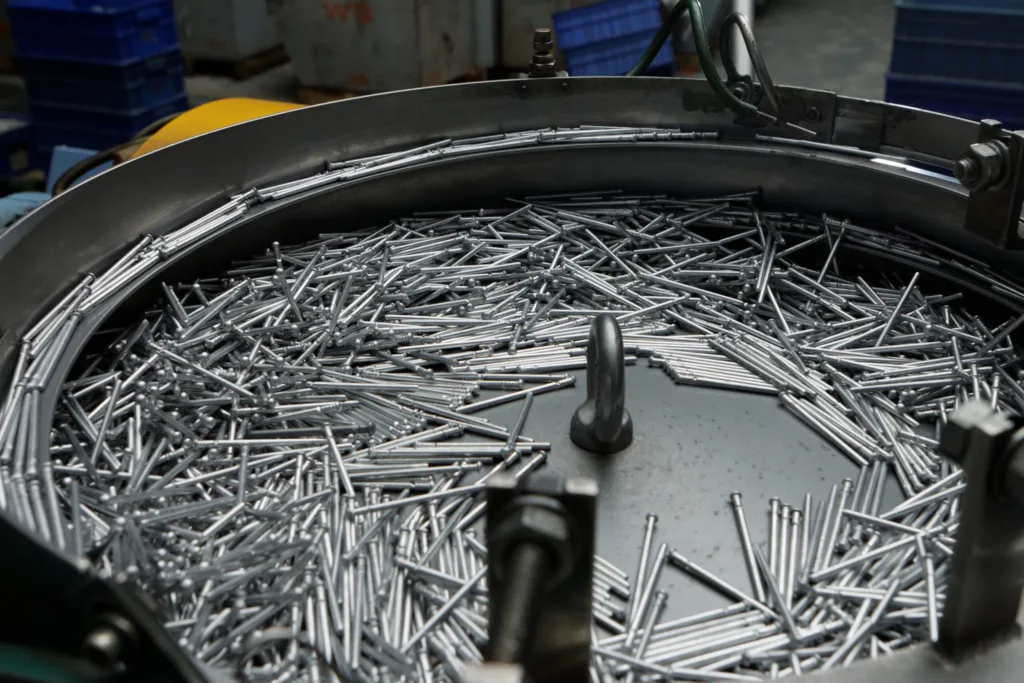
Contact Our Engineers Today
We provide you with high quality rivets, including customized services.
FAQs
What are the Head Types of DIN 7337 Blind Rivets?
DIN 7337 Blind Rivet, like the ISO standard, are available in three basic head types.
Do DIN 7337 Blind Rivets Conform to ISO Standards?
In some cases, the DIN 7337 standard and the ISO standard consist of overlaps or similarities, especially in the case of designing international common specifications. Of course, there are some rivet manufacturers who can produce blind rivets to DIN 7337 as well as to ISO.
Are Corrosion Treated DIN 7337 Rivets Available?
Of course! Blind rivets under DIN 7337 are corrosion-resistant. Common blind rivets with corrosion protection properties and treatments are listed below:
- Galvanized rivets
- Stainless steel rivets
- Aluminum rivets
- Surface coated rivets
Wholesale Blind Rivets DIN 7337 from Rivmate
If you want to buy DIN7337 Blind Rivets in bulk, please contact us!
Rivmate is one of the top rivet manufacturers in China, which can provide you with Blind Rivets according to DIN 7337, ISO and IFI standards. Get free samples now.
